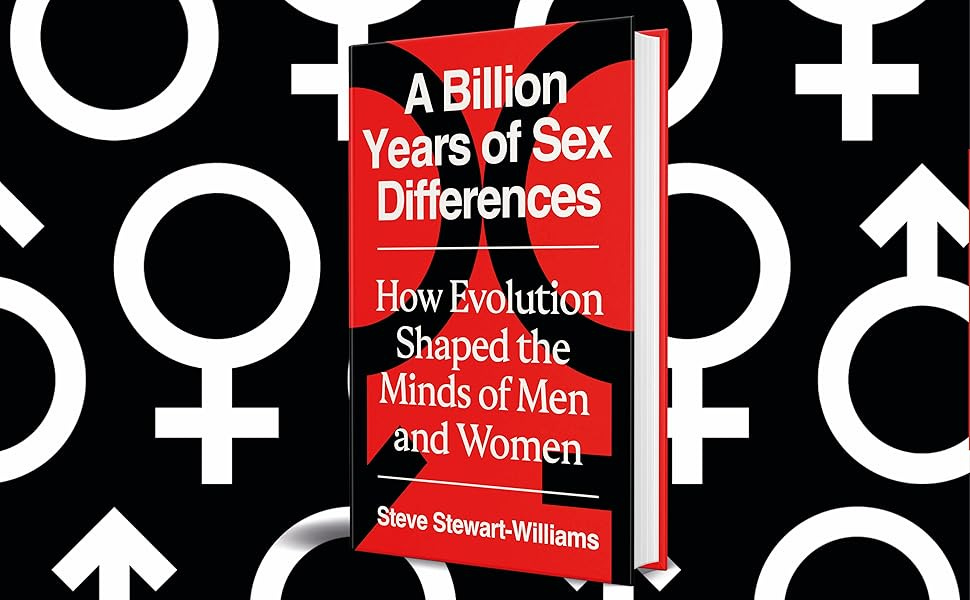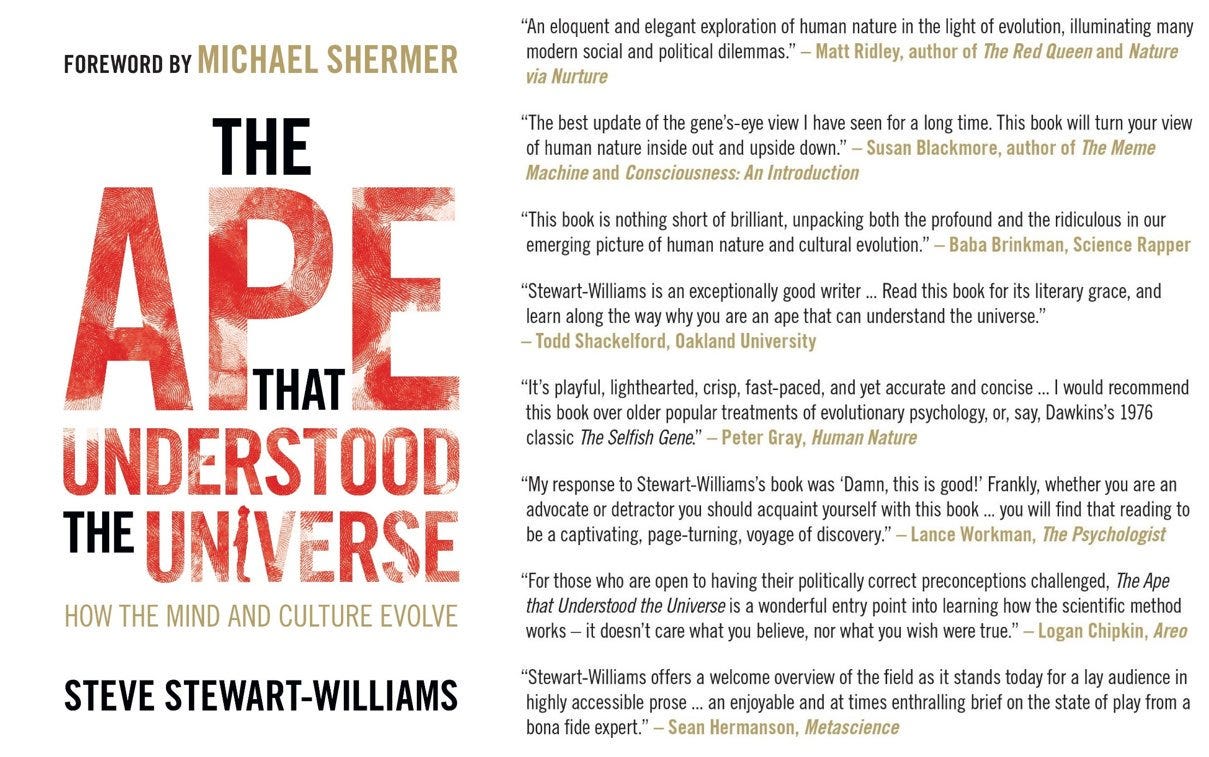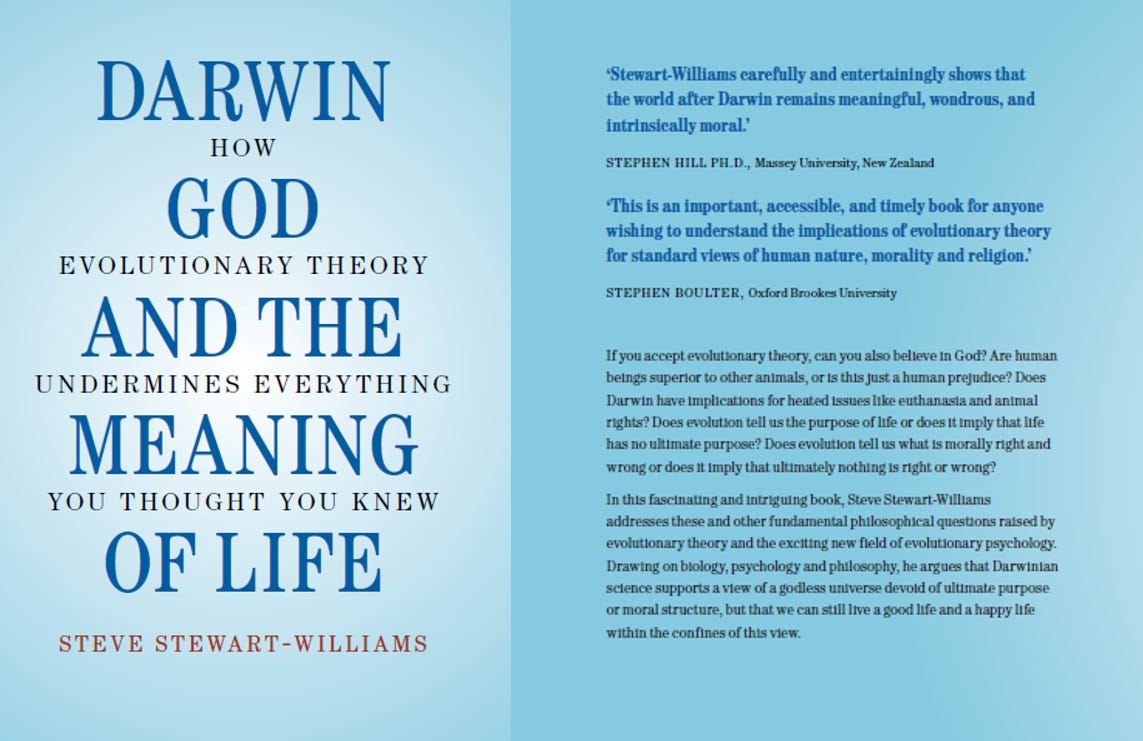My Books
A Billion Years of Sex Differences (2026)
My third book, A Billion Years of Sex Differences, will hit the shelves in June 2026 (2027 in the US and Canada)! Here’s the blurb:
According to an old joke, everyone knows that men and women are different… except social scientists. In A Billion Years of Sex Differences, evolutionary psychologist Steve Stewart-Williams tackles some of science’s most controversial questions: How do men and women differ? Where do the differences come from? And how do they shape modern life?
The result is the most up-to-date, balanced, and engaging account of human sex differences on the market, covering everything from dating and mating to aggression and parenting, from children’s toy preferences and workplace gender gaps to mental health and the politics of equality.
Drawing on a century of research, and a billion years of evolution, Stewart-Williams argues that differences between men and women aren’t just social constructs but are legacies of our evolutionary history – and that well-intentioned efforts to erase them can sometimes do more harm than good.
You’ll learn why:
Many sex differences appear despite socialization, not because of it.
Both sexes have their equivalents of the peacock’s tail and the deer’s antlers.
In our mating and parenting patterns, humans are more like the average bird than the average mammal.
Downplaying sex differences can be just as harmful as exaggerating them.
Sex differences are sometimes a sign of social health rather than social injustice.
With more than two decades of research in evolutionary psychology and an international reputation in the field, Steve Stewart-Williams is uniquely positioned to challenge prevailing views in this fraught debate. Avoiding the extremes of either overstating or denying the differences, he argues that, rather than trying to make men and women identical, we should strive for a world where bias and barriers are eliminated, and where people are free to be themselves whether they conform to gender norms or defy them.
Praise for A Billion Years of Sex Differences
“A Billion Years of Sex Differences is fearless, fascinating, and fair-minded—a beautifully written exploration of how and why women and men differ. I can’t think of a better book on the science of sex differences.”
―Paul Bloom, Professor of Psychology at the University of Toronto, and Brooks and Suzanne Ragen Professor Emeritus of Psychology at Yale University, author of Psych: The Story of the Human Mind
“One of my favourite topics from one of the best psychology writers alive. Spectacular.”
―Chris Williamson, author, speaker, host of the Modern Wisdom Podcast
“In A Billion Years of Sex Differences, evolutionary psychologist Steve Stewart-Williams has penned the best scientific work on the subject to date—and it has the added bonus of being a gripping good read.”
―Michael Shermer, publisher of Skeptic magazine, author of Why Darwin Matters, The Moral Arc, Conspiracy, and Truth
“Steve Stewart-Williams explains, with authority and wit, how our evolved differences play out in dating, mating, and parenting, and why facing these facts is essential for a fairer, more compassionate society. If anyone doubts the relevance of evolution to human behavior, hand them this book.”
―Carole Hooven, author of T: The Story of Testosterone, the Hormone that Dominates and Divides Us
“In this fluent and fascinating book, Steve Stewart-Williams explains whether, how and above all why men and women, like most mammals, have somewhat different brains as well as different bodies.”
―Matt Ridley, author of The Red Queen, The Rational Optimist, and Birds, Sex and Beauty
“I thought I’d get bored after half a billion years of sex differences, but this engaging, well-written and funny book kept me hooked to the end.”
―Jimmy Carr, comedian, writer, television host
“A terrific book—scholarly and anchored in the most current science, yet also highly engaging and readable for any audience. It’s sure to become a classic on the fascinating science of sex differences. Reading it will give women and men alike a deeper understanding of each other.”
―David Buss, Professor of Psychology, University of Texas at Austin, author of The Evolution of Desire and Evolutionary Psychology: The New Science of the Mind
“You don’t know about men and women until you’ve read Steve Stewart-Williams. Unvarnished and always fascinating truth from one of the world’s leading authorities and most entertaining writers on sex differences.”
―Will Storr, author of The Status Game and The Science of Storytelling
“A Billion Years of Sex Differences is a fascinating and thorough exploration of psychological sex differences. Fully accessible to newcomers, yet far-reaching enough to be worthwhile to seasoned readers, it challenges both the progressive tendency to minimise sex differences in pursuit of equality-as-sameness and the conservative impulse to exaggerate them to uphold rigid gender roles. With clarity, rigour, and wit, Steve Stewart-Williams demonstrates that evolutionary psychology can help us understand what is true about sex differences without losing sight of individual variation, freedom and dignity.”
―Helen Pluckrose, author of Cynical Theories: How Activist Scholarship Made Everything About Race, Gender, and Identity—and Why This Harms Everybody
“This lucid and vivid book cuts through the fog and balderdash surrounding the conversation about sex differences in our species. It is balanced and careful, informative and engaging, and it offers a way forward to anyone who wants to avoid the harms that can come from either minimizing or exaggerating differences between men and women.”
―Nicholas Christakis, MD, PhD, Sterling Professor of Social and Natural Science, Yale University, author of Blueprint: The Evolutionary Origins of a Good Society
“This book will be a classic—it is engaging, clear, and informative from cover to cover, and had me chuckling nearly as often as I said, ‘Aha!’ I’m already planning to use it in my classes!”
―April Bleske-Rechek, Professor of Psychology, University of Wisconsin-Eau Claire
The Ape That Understood the Universe (2018)
The Ape that Understood the Universe is the story of the strangest animal in the world: the human animal. It opens with a question: How would an alien scientist view our species? What would it make of our sex differences, our sexual behavior, our altruistic tendencies, and our culture? The book tackles these issues by drawing on two major schools of thought: evolutionary psychology and cultural evolutionary theory. The guiding assumption is that humans are animals, and that like all animals, we evolved to pass on our genes. At some point, however, we also evolved the capacity for culture - and from that moment, culture began evolving in its own right. This transformed us from a mere ape into an ape capable of reshaping the planet, travelling to other worlds, and understanding the vast universe of which we're but a tiny, fleeting fragment. Featuring a new foreword by Michael Shermer.
Praise for The Ape That Understood the Universe
Todd Shackelford (Oakland University): “Stewart-Williams is an exceptionally good writer... The Ape that Understood the Universe is a rare accomplishment: equal parts intellectual exhilaration and beautifully crafted narrative.” ● Charles Bick: “This book is a captivating exploration of human nature, packed with mind-blowing insights and written in a way that’s both smart and entertaining. It’s like having a brilliant friend explain complex ideas over a coffee.” ● Susan Blackmore (University of Plymouth): “This book will turn your view of human nature inside out and upside down.” ● Lance Workman (Bath Spa University): “My response to Stewart-Williams’s book was ‘Damn, this is good!’... a captivating, page-turning, voyage of discovery... Stewart-Williams is not only an experienced evolutionary psychologist but also a talented and insightful writer with a memorable turn of phrase... a twenty-first century successor to The Selfish Gene.” ● Helen Fisher (Indiana University, Rutgers University): “an insightful, accurate and refreshingly amusing read.” ● Sean Hermanson (Florida International University): “an enjoyable and at times enthralling brief on the state of play from a bona fide expert.” ● Jerry Coyne (University of Chicago): “Like Darwin, Stewart-Williams is always anticipating readers’ queries and criticisms, and addresses them throughout the book.” ● Chris Williamson (Modern Wisdom podcast): “SSW writes one of the easiest to read books in this entire list but delivers hammer blows of insight on every page… It’s an endless barrage of jaw dropping discoveries and incredibly accessible. You’ll be highlighting every other paragraph.” ● Lance Workman and Will Reader (Evolutionary Psychology: An Introduction): “An extremely well-written and funny introduction to evolutionary psychology (and more).” ● Michael Shermer (founder of Skeptic magazine): “[Stewart-Williams] presents what I think is the best refutation of Cognitive Creationism ever penned... Stewart-Williams doesn’t straw-man the arguments from cognitive creationists… he steel-mans their claims by making the best argument in their favor, and then refutes them systematically with evidence and logic… The entire book is a masterpiece of scientific reasoning... A compelling read – I learned something new on every page.”
Achievements
Cambridge University Press named Ape one of its Books of the Year in 2018 and established a new “brainy non-fiction” trade series based in part on its success. Ape was released in hardback and audiobook, and then in a revised paperback edition with a foreword by Michael Shermer, the founder of Skeptic magazine. The audiobook was among Cambridge’s first, and the new venture was again inspired in part by the book’s success. Ape has been translated into Italian, Korean, Polish, and Turkish, with three more translations in the pipeline (Chinese, Japanese, and Portuguese). It has been used as a textbook for various university courses. In November 2025, Universidad Francisco Marroquín Madrid hosted a conferences about the book. Ape has even had some pop-culture impact, inspiring a rap song and a folk song. (Click here for a discussion of the folk song in The Financial Times.)
Darwin, God and the Meaning of Life (2010)
If you accept evolutionary theory, can you also believe in God? Are human beings superior to other animals, or is this just a human prejudice? Does Darwin have implications for heated issues like euthanasia and animal rights? Does evolution tell us the purpose of life, or does it imply that life has no ultimate purpose? Does evolution tell us what is morally right and wrong, or does it imply that ultimately nothing is right or wrong? In this fascinating and intriguing book, Steve Stewart-Williams addresses these and other fundamental philosophical questions raised by evolutionary theory and the exciting new field of evolutionary psychology. Drawing on biology, psychology and philosophy, he argues that Darwinian science supports a view of a godless universe devoid of ultimate purpose or moral structure, but that we can still live a good life and a happy life within the confines of this view.
Praise for Darwin, God and the Meaning of Life
Christopher Land and Todd Shackelford (Evolutionary Psychology): “Darwin, God and the Meaning of Life is a trailblazing advancement of the application of scientific values to traditionally metaphysical questions.” ● Jerry Coyne (Why Evolution is True): “Darwin, God and the Meaning of Life is the best discussion I’ve seen about the philosophical implications of the theory of evolution; and believe me, there are philosophical implications-dealing with issues like the existence of the soul, the nature of morality, and human exceptionalism. I recommend it highly: Stewart-Williams, an associate professor of psychology at Nottingham University, writes very well and has thought deeply about these issues. Even if you think you understand the implications of evolution for your worldview, you’ll still learn a lot.” ● Ian Boyne (The Gleaner): “A disturbing and provocative book... refreshingly honest.”
Achievements
Darwin, God and the Meaning of Life was widely discussed and reviewed, and translated into Italian, Turkish, and Polish, with a second edition of the Italian translation released in 2020. Arguably the book’s biggest accomplishment is that, in January 2012, a group of Italian academics organized a two-day conference in Torino, Italy, specifically to debate the ideas in the book. The conference was led by professors from a wide range of fields, including theologians, bioethicists, and geneticists.



